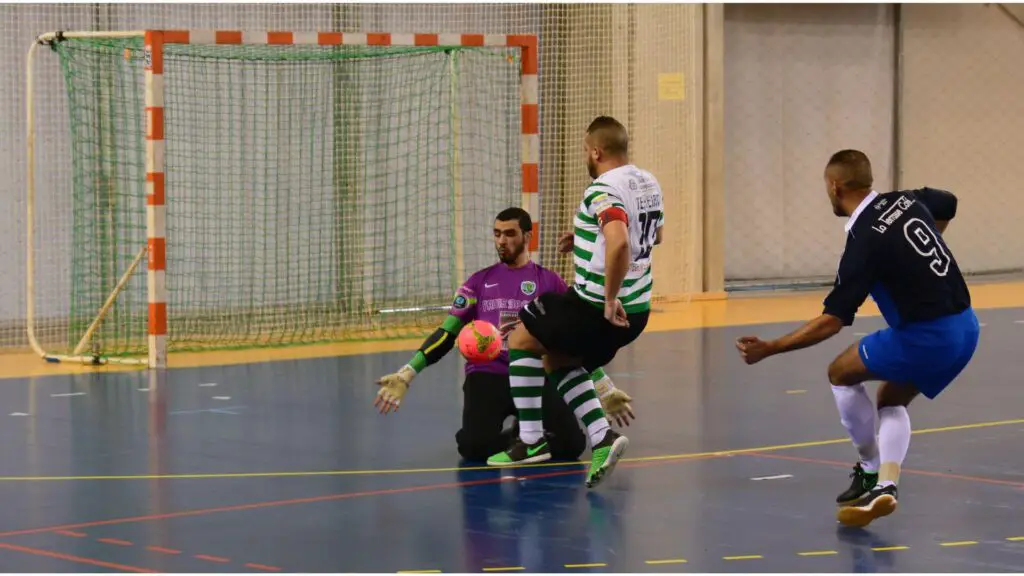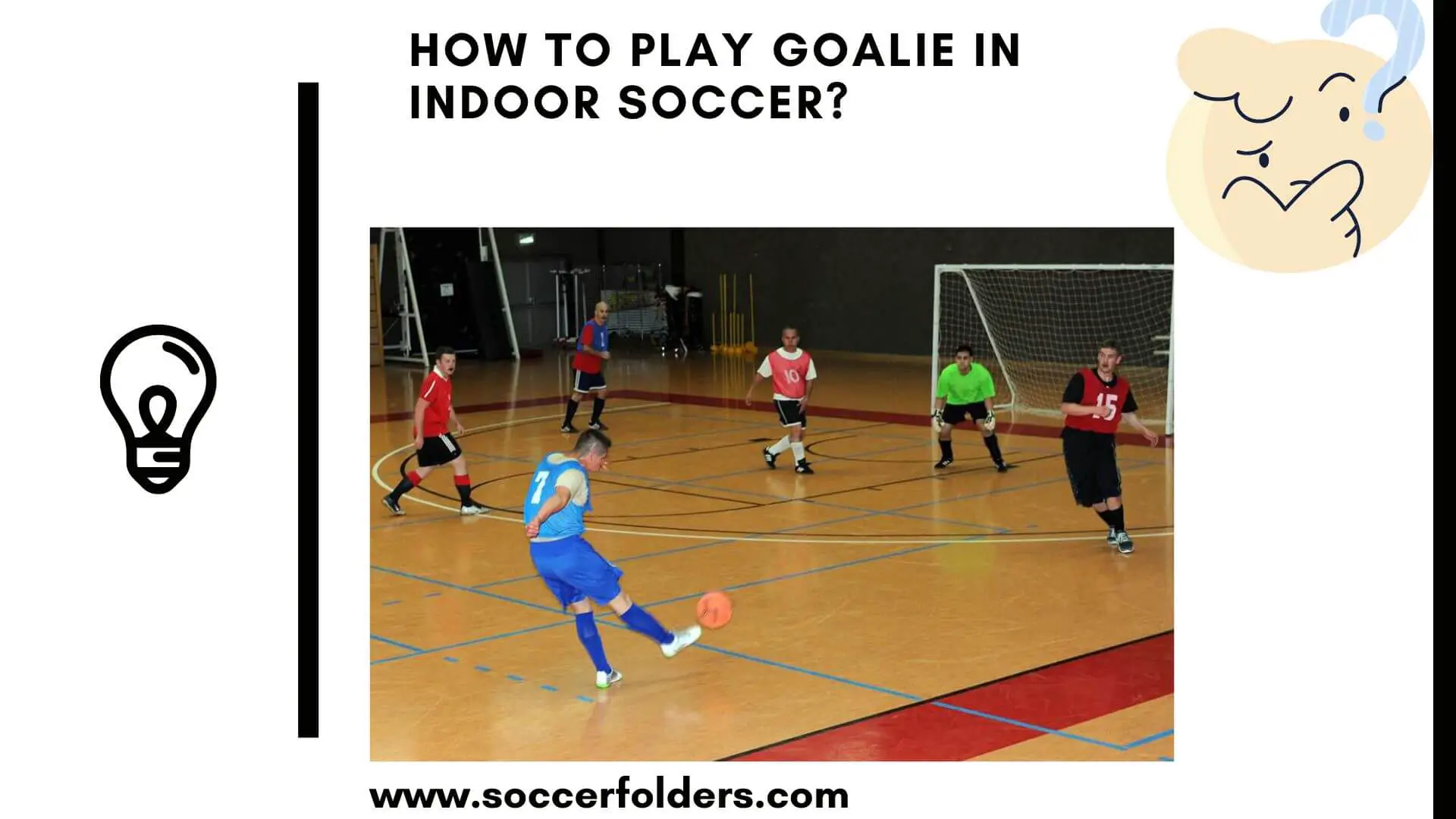Indoor soccer is a fast-paced game that requires a unique set of skills and strategies from each player. As a goalkeeper, your role is crucial in protecting your team’s goal and keeping the opposition from scoring. But how do you play goalie in indoor soccer?
In this post, we’ll guide you through the key skills, strategies, and tips that you need to know to become a successful indoor soccer goalie.
Let’s get started.
How to Play Goalie in Indoor Soccer?
To become a successful indoor soccer goalkeeper, you can follow the following:
- Develop quick footwork and mobility to move around the small playing area.
- Use effective communication skills to coordinate with your teammates and anticipate shots.
- Develop a range of shot-stopping techniques to block shots from close range and long-range shots that come quickly.
- Enhance your passing skills and the ability to make quick decisions under pressure to distribute the ball effectively after making a save.
- Stay mentally tough and composed under pressure, staying focused and not getting too frustrated or distracted by any mistakes.
- Watch professional indoor soccer goalkeepers and learn from their techniques and strategies.
- Wear the right gear, including gloves, shin guards, and appropriate footwear.
- Stay hydrated throughout the game to maintain your high intensity.
- Practice regularly to improve your skills in footwork, shot-stopping, passing, and decision-making.
==>> You can also read these basic indoor soccer goalie tips to improve your game.
Here is an in-depth explanation of some of the points listed above.
1. Footwork and Mobility
Footwork and Mobility One of the most critical skills that any indoor soccer goalkeeper must have is quick footwork and mobility.
The fast-paced nature of the game means that you’ll need to be agile, flexible, and fast on your feet. You’ll also need to be able to change direction quickly and maintain your balance while moving.
To develop your footwork and mobility, you can start by practising some basic drills, such as ladder drills and cone drills. These drills will help you improve your footwork, agility, and speed, which are crucial for a successful indoor soccer goalkeeper.

2. Positioning
As a goalkeeper, your positioning is crucial in determining whether or not you’ll be able to save a shot.
You need to be able to read the game and anticipate where the ball is going to be before it arrives. This means positioning yourself correctly within the goal area and being ready to make a save at any moment.

A good rule of thumb for positioning is to stay slightly forward in your goal area, giving you more space to react to the ball.
You should also keep your feet slightly wider than shoulder-width apart and be ready to move in any direction quickly.
3. Communication
Effective communication is essential for a successful indoor soccer goalkeeper.
You need to be able to communicate with your defenders and let them know when to mark players, when to clear the ball, and when to push forward.
Communication can also help you anticipate where the ball is going to be, as your defenders can provide you with information about the opposition’s attacking players and their movements.
4. Shot-Stopping Techniques
As a goalkeeper, your main objective is to stop shots from going into the goal. To do this effectively, you need to develop a range of shot-stopping techniques, including diving, blocking, and catching.
When making a save, always try to get your body behind the ball and use your hands to deflect the ball away from the goal area.
You should also be prepared to dive and make saves with your feet, as shots can come from any angle.
5. Dealing with Set-Pieces
Set pieces, such as free kicks and corners, are a common occurrence in indoor soccer.
As a goalkeeper, you need to be able to anticipate where the ball is going to go and position yourself accordingly.
During set pieces, you should communicate with your defenders to ensure that they are marking the opposition’s players effectively.
You should also be prepared to come off your line to punch the ball away or catch it if necessary.
6. Quick Distribution
Once you’ve made a save, you need to be able to distribute the ball quickly and effectively to your teammates. This can help your team to counter-attack and catch the opposition off-guard.
To improve your distribution, practice throwing the ball accurately to your teammates or kicking it long down the field.
You should also be aware of where your teammates are positioned and try to pass the ball to them as quickly as possible.
7. Mental Toughness
Finally, indoor soccer goalkeeping requires a certain level of mental toughness. You’ll face a lot of pressure, and staying focused and composed at all times is essential.
To develop your mental toughness, try to stay positive and focused during games.
Visualize yourself making saves and communicating with your defenders effectively.
You should also learn to stay calm and relaxed under pressure, as this can help you to make quick and accurate decisions during the game.
In addition to these key skills and strategies, there are a few other tips that can help you become a successful indoor soccer goalkeeper:
- Wear the right gear: Make sure you have the right gear, including gloves, shin guards, and appropriate footwear.
- Stay hydrated: Indoor soccer is a high-intensity sport, so make sure you stay hydrated throughout the game.
- Watch professional goalkeepers: Watch professional indoor soccer goalkeepers to learn from their techniques and strategies.
- Practice, practice, practice: The more you practice, the better you’ll become. Set aside time to practice your footwork, shot-stopping, and distribution skills.
Ultimately, becoming a successful indoor soccer goalkeeper requires a combination of physical skills, mental toughness, and strategic thinking. By developing your footwork, positioning, shot-stopping techniques, and communication skills, you’ll be well on your way to becoming a top goalkeeper.
Final Thoughts
Playing goalie in indoor soccer requires a unique set of skills and strategies.
To become a successful indoor soccer goalkeeper, you need to develop quick footwork and mobility, effective communication skills, and a range of shot-stopping techniques. You should also focus on staying mentally tough and composed under pressure, and practice regularly to improve your skills.
By following these tips and strategies, you’ll be well on your way to becoming a top indoor soccer goalkeeper.
Hope you have gained value from this article.

